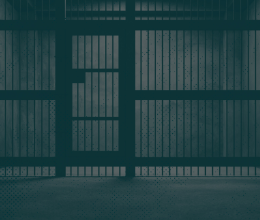
FLORENCE, AZ—The American Civil Liberties Union, the ACLU of Arizona, and law firm Perkins Coie LLP filed a federal lawsuit today against the warden of a private prison run by CoreCivic, the United States Marshals Service, and the Bureau of Prisons. The suit demanded that the defendants ensure that the facility comply with public health guidelines to protect incarcerated people from the threat of COVID-19.
Attorneys are suing on behalf of five plaintiffs with high-risk medical issues, including leukemia, kidney cancer, asthma, and high blood pressure, detained at the privately-run Central Arizona Florence Correctional Complex in Florence, Arizona. The facility mostly houses people charged with federal crimes who are being held pre-trial and have therefore not been convicted of a crime. Attorneys are seeking class-action relief.
The U.S. Marshals in Arizona reported yesterday that 13 people detained at the facility have tested positive for COVID-19 and over 400 people are being quarantined. The outbreak is growing rapidly.
"For months, public health officials and corrections experts have warned that under current circumstances prisons and jails will become especially potent vectors for the rapid spread of COVID-19 inside the facilities and in the surrounding communities," said Emma Andersson, senior staff attorney with the ACLU's Criminal Law Reform Project. "Around the country, this prediction has become a bleak reality. The infection rate and death count among incarcerated people and those who work in prisons and jails has exploded and continues to worsen by the day. Our clients at Florence, who include mothers with underlying medical conditions, are constitutionally-entitled to be treated humanely. We hope the court will force the responsible parties – including CoreCivic, the private company that runs the facility– to give our clients a fighting chance of living through this pandemic.”
“We have heard from people inside of these facilities about their fears of contracting COVID-19,” said Jared Keenan, criminal justice staff attorney at the ACLU of Arizona. “This is a simple matter of compassion. It is clear that the prison is not taking the necessary steps to keep incarcerated people and by extension, the general public, safe. We hope the court realizes it must act to protect those who cannot protect themselves due to being incarcerated.”
In interviews with plaintiffs, attorneys from the ACLU’s Criminal Law Reform Project, the LGBT & HIV Project, the Racial Justice Program, the ACLU of Arizona, and Perkins Coie LLP uncovered frightening conditions at CoreCivic’s facility.
One 50-year-old mother of three suffering from kidney cancer has been denied cancer treatment. She recently developed a fever and cough, but has not been tested for COVID-19.
Another plaintiff is a 39-year-old mother of three who’s been diagnosed with leukemia. Before being detained at CoreCivic, she was undergoing treatment for this condition, attending regular appointments, and taking medicine. She has asked CoreCivic staff, at least twice, to continue her medical treatments. Yet her last treatment was over a year ago.
“The U.S. Bureau of Prisons and U.S. Marshals Service have a constitutional duty to protect the people in their custody from the grave risk of contracting COVID-19," said Jean-Jacques Cabou, Partner at Perkins Coie. "The public health evidence is clear that social distancing and heightened sanitation practices are necessary to fulfill that duty, and yet our government, along with CoreCivic, has failed to do these basic things. That’s against the law.”
Similar lawsuits have been filed by the ACLU throughout the country, including in D.C., Texas, Louisiana, Massachusetts, and California, among others.
This lawsuit is among many efforts that the ACLU has undertaken over the last two months to reduce the number of people entering into jails and prisons, improve conditions, increase government transparency, and ultimately liberate people from dangerous, even deadly, conditions in prisons, jails and detention facilities during this pandemic.
The filing can be viewed, here.





